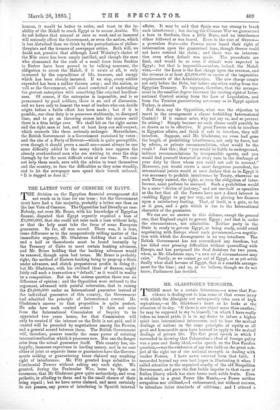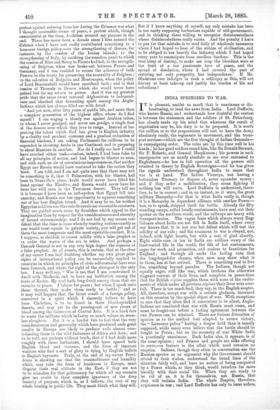MR. GLADSTONE'S THOUGHTS. MR. GLADSTONE'S THOUGHTS. T HERE must be a
certain bitterness,—a sense that Providence is dealing-out to him some of that severe irony with which the Almighty not unfrequently tries men of high aspirations,—at Mr. Gladstone's heart as he looks at the situation of to-day. 'If there is one object more than another,' he may be supposed to day to himself, in which I have really taken an honest pride, it is in my desire to infuse a higher spirit into international intercourse, and to base the mutual dealings of nations on the same principles of equity as all good and honourable men have learned to apply in the mutual dealings of private life. The first great speech in which I succeeded in showing that Palmerston's ideal of foreign policy was a poor and flashy ideal,—the speech on the Don Pacifico question,—was the confession of my own faith on the great subject of the right use of our national strength in dealing with weaker Powers. I have -never swerved from that faith. I succeeded beyond my own best hopes in illustrating it when I called attention to the organised cruelty of the old Neapolitan Government, and gave the first feeble impulse to that cause of Italian liberty which has since borne such noble fruits. Even in relation to a great Power like Russia,—a Power neither scrupulous nor civilised,—I endeavoured, not without success, to introduce fairer standards of criticism; and I uttered a protest against refusing from her daring the Crimean war what I thought reasonable terms of peace, a protest which, though unsuccessful at the time, doubtless secured my purpose in the end. There has never been a decade since I first entered the Cabinet when I have not really contributed something to a humaner foreign policy,—to the strengthening of Greece, for instance, by the cession of the Ionian islands ; to the strengthening of Italy, by soothing the senseless panic to which the cession of Nice and Savoy to France had led; to the strengthening of Belgium, when war broke-out between France and Germany, and I was enabled to secure the adhesion of both Powers to the treaty for preserving the neutrality of Belgium ; to the salvation of Bulgaria and Montenegro, when the policy of Lord Beaconsfield would have sacrificed both ; and to that cession of Thessaly to Greece which she would never have gained but for my return to power. And it was my greatest pride that the same event restored Afghanistan to independence and checked that fire-eating spirit among the AngloIndians which has always filled me with dread.
'And yet now, after fifty years of public life, and more than a complete generation of the highest office, where do I find myself ? I am waging a bloody war against Arabian tribes, to whom I never grudged, and never can grudge, a single foot of the deserts over which they love to range. Instead of improving the talent which God has given to English industry by a thrifty and prudent economy and a gradual reduction of financial burdens, I am asking Parliament for millions to be expended in shooting Arabs in one Continent and in preparing to shoot Russians in another. Nor do I really see how I could have avoided either task,—unless, indeed, I had been false to all my principles of action, and had begun to bluster so soon, and with such an air of ostentatious imperiousness, that neither Egypt nor Russia would have ventured to take the action they have. I am told, and I am not quite sure that there may not be something in it, that if Palmerston, with his bluster, had been in Granville's place, Arabi would never have lifted his hand against the Khedive, and Russia would never have let loose her wild men in the Turcoman deserts. They tell me it is because I have been so soft-spoken that Egypt fell into anarchy, and Russia saw her opportunity to squeeze something out of her best English friend. And it may be so, for neither Egyptian soldiers nor Slavonic Generals are reasonable creatures. They are guided much more by flourishes which appeal to the imagination than by respect for the considerateness and sincerity of honest statesmanship; and I do not feel by any means confident that the time is come when by trusting nations exactly as you would trust equals in private society, you will get out of them the most temperate and the most equitable conduct. It is, I suppose, as childish to reason mildly with a false prophet as to order the waves of the sea to retire. And perhaps a Cossack General is not in any very high degree the superior of a false prophet. At all events, this is certain, that at the close of my career I am half doubting whether my own great principles of international policy can be successfully applied to countries in which no principles of civic self-restraint have ever been fostered, and where the right of the strongest is the only law. I may well say, "Woe is me, that I am constrained to dwell with Meshech, and to have my habitation among the tents of Kedar. My soul hath long dwelt among them that are enemies to peace. I labour for peace ; but when I speak unto them thereof, they make them ready to battle ;" and so it may well happen that the latest result of a foreign policy, conceived in a spirit which I sincerely believe to have been Christian, is to. be found in these blood-sprinkled deserts, and may yet be the pouring-out of new rivers of blood among the fastnesses of Central Asia. It is a hard fate to waste the millions which industry so much values on senseless slaughter. But it is a harder fate to feel that the very considerateness and generosity which have produced such great results in Europe are likely to produce evils almost overbalanoing them in the wild fastnesses of Africa and Asia ; and to be told, not perhaps without truth, that if I had dealt more roughly with these barbarians, I should have spared both English blood and treasure, and the lives of innocent warriors who find a sort of glory in dying by English bullets or English bayonets. Truly, at the end of my career Providence is showing me that the reasonableness and humility which may take the form of frankness in Europe, must disguise their real attitude in the East, if they are not to be mistaken for that poltroonery for which all my enemies give me credit in their complete ignorance of the deep tenacity of purpose, which is, as I believe, the root of my whole bearing in public life. They must think what they will. But if I know anything of myself, my only mistake has been in too easily supposing barbarians capable of self-government, and in thinking them willing to recognise disinterestedness where disinterestedness really exists. And the penalty I have to pay for that mistake is to read daily of wholesale massacres where I had hoped to hear of the strides of civilisation, and to be obliged to tax heavily the industry which I had hoped every year to emancipate from needless burdens. This is the true irony of destiny, to make me reap the bloodiest wars as the fruit of a too passionate lave of peace, and the spread of desolation, where I had coveted the part of restoring not only prosperity, but independence.' If Mr. Gladstone ever indulges in such a soliloquy as this, will not history at least take-up and justify the burden of his sad reflections ?



































 Previous page
Previous page